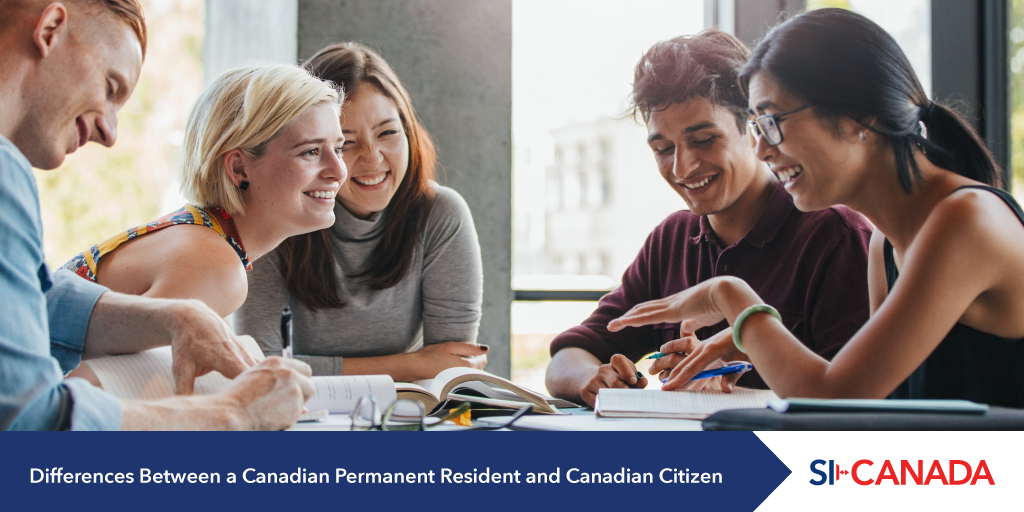International students who want to study in Canada, need to understand some concepts before they can decide how they are going to spend their time studying and working in the country. Understanding the distinctions between Canadian permanent residency and citizenship is one of those crucial aspects that can help you navigate the country's immigration landscape in the long run.
While both statuses offer certain rights and privileges, they also come with distinct obligations and limitations, which must be known in advance to navigate the immigration routes to live in Canada after graduation. Learn more below, and if you have any questions about Canadian study as an international student, book a free consultation call with SI-Canada today.

3 Differences Between a Canadian Permanent Resident vs Citizen
1. Legal status and citizenship
The primary difference between Canadian permanent residents and citizens is their legal status and citizenship. A permanent resident is an individual who has been granted the right to live and work in Canada indefinitely, with most of the same rights and privileges as Canadian citizens, except for the right to vote and hold certain government positions. Permanent residents hold a Permanent Resident Card (PR card) and must maintain their status by meeting residency requirements and complying with Canadian laws during their stay in the country.
In contrast, Canadian citizens have acquired citizenship through birth, naturalization, or descent. Citizenship grants people full legal rights and privileges within the country, including voting in federal, provincial, and municipal elections. They can also run for public office and access consular assistance while living abroad in any other nation. Canadian citizens also hold Canadian passports, which enable them to travel freely and enjoy diplomatic protection worldwide.
2. Residency requirements and travel restrictions
Permanent residents must fulfill residency obligations to maintain their status, typically involving residing in Canada for at least two years within five years. Failure to meet these residency requirements may result in losing permanent resident status and potential deportation from Canada.
On the other hand, Canadian citizens cannot maintain residency requirements and can live abroad indefinitely without losing their citizenship status in Canada. Citizens can travel in and out of Canada without restrictions, allowing them to work, study, or reside abroad for extended periods while retaining their citizenship rights and privileges. Additionally, Canadian citizens can access consular services and assistance from Canadian embassies and consulates worldwide in case of emergencies or legal issues abroad.
3. Rights and privileges
While both permanent residents and citizens enjoy many of the same rights and privileges in Canada, there are certain distinctions between the two statuses. Canadian citizens have full political rights, including voting and participating in democratic processes, such as running for public office and serving on juries. Citizens also have unrestricted access to government benefits and social services, such as healthcare, education, and social assistance programs.
While granted many of the same rights and protections as citizens under Canadian law, permanent residents do not have the right to vote in elections or hold certain government positions. Additionally, depending on provincial or territorial regulations, permanent residents may face limitations on accessing certain government benefits and social services. However, permanent residents can work and study in Canada, access healthcare services, and enjoy other fundamental rights protected by Canadian law.
Study in Canada
One of the best ways to become a permanent resident and citizen of Canada is to study there. If you wish to pursue higher studies in Canada, book a free consultation with us today to start your application.
FAQ
How do you qualify for permanent residency in Canada?
To qualify for permanent residency in Canada, individuals must meet the eligibility criteria of one of the many immigration programs offered by the Canadian government. Applicants are often required to apply, provide supporting documents, undergo medical and security checks, and meet specific financial requirements. Upon approval, successful applicants receive a Confirmation of Permanent Residence (COPR) and may obtain permanent resident status, granting them the right to live, work, and study in Canada indefinitely.
What is the difference between Canadian citizenship and Canadian permanent residency PR?
The primary difference between Canadian citizenship and permanent residency lies in legal status and privileges. Canadian citizens can vote in elections, run for public office, and hold Canadian passports, granting them unrestricted access to government services and benefits. On the other hand, permanent residents can live, work, and study in Canada indefinitely but cannot vote or run for office.
Can I apply for permanent residency in Canada?
Yes, individuals can apply for Canada Permanent Residency (PR) themselves through various immigration programs offered by the Canadian government, which include the Express Entry system, Provincial Nominee Programs (PNPs), family sponsorship, and other specific streams tailored to different categories of applicants.
What is free with Canadian citizenship?
With Canadian citizenship, individuals can access various benefits and privileges unavailable to permanent or temporary residents. Some of these benefits include the right to vote in federal, provincial, and municipal elections, eligibility to run for public office, access to a Canadian passport for travel purposes, and the ability to apply for government jobs that require Canadian citizenship. They also have unrestricted access to healthcare services, social assistance programs, and education subsidies, making citizenship a valuable asset for those looking to integrate fully into Canadian society.
What is the fastest way to get PR in Canada?
The fastest way to obtain permanent residency in Canada is through the Express Entry system. This points-based system assesses candidates based on age, education, work experience, language proficiency, and adaptability. Qualified candidates receive an Invitation to Apply (ITA) for PR, and processing times can be relatively quick compared to other immigration streams, with some applications processed in as little as six months.
Which province is easy for PR in Canada?
While each province in Canada has its own Provincial Nominee Program (PNP) with specific eligibility criteria and application processes, some provinces have relatively more straightforward pathways to permanent residency (PR) than others. For example, provinces like Saskatchewan, Manitoba, and Nova Scotia are often considered more accessible for PR through their PNPs due to lower eligibility requirements, fewer restrictions, and higher allocation of nomination certificates.














